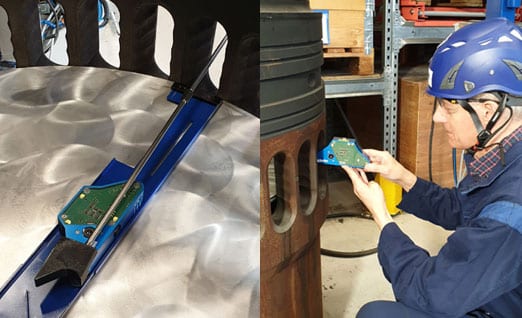Chris-Marine has launched an Advanced Camera for Cylinder Liner Condition Monitoring.
“The launch of our Cylinder Liner Condition Camera LCC is an important step for us and for our customers,” says Alexander Malt, Global Sales & Marketing Director at Chris-Marine. “We know that at least 10% of newbuildings need to have their cylinder liners replaced already before the first dry-docking, a costly consequence of failing to keep the liners in top condition. However, this problem can easily be prevented and that’s where our camera comes into play. LCC detects and documents abnormal surface conditions and helps the engine crew determine if measures need to be taken. By monitoring the condition of the liner regularly, severe damage to the engine can be prevented and unnecessary investments avoided, Alexander Malt continues.”
The images captured by the camera are used to evaluate cylinder condition parameters like presence of cylinder honing marks and wave-cut groove extension, black lacquering and bore polish, size of cylinder wear edge and cleanliness of ring land. In addition, the pictures can be used to inspect exhaust valve, fuel injector valves, lube oil injection area and start air valve.
LCC provides images from BDC (bottom dead center) to TDC (top dead center).
Chris-Marine AB today announced the launch of its Cylinder Liner Condition Camera, LCC. LCC is used for in situ photography of the cylinder liner walls and the exhaust valve in 2-stroke engines.
LCC
The LCC unit has 4 built-in cameras to enable photography of the complete liner running surface, cylinder cover, lube oil injection area, exhaust valve, start air valve and injector valves.
The LCC is capable of in situ cylinder condition documentation of 2-stroke engines with a bore size from 480 to 980 mm.
LCC is made up of high-temperature resistant electronic components and batteries allowing operation without lowering engine coolant temperature for most engine types.
With fully charged batteries it is possible to document up to 14 cylinders and time required per cylinder is approximately 15 minutes.
Tools for centering, inserting and extracting the camera and checking clearance at TDC are included with the LCC.
There is no need to remove cylinder cover or exhaust valve housing when using the LCC (only venting of combustion chamber is necessary, e.g. by opening the indicator valve).
The LCC can be combined with Chris-Marine’s Liner Diameter Measurement Instrument LDM by using the LDM tablet.

